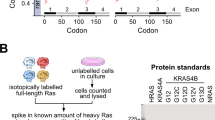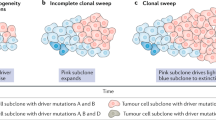Abstract
Variability in the phenotype of cells comprising individual tumours is a striking feature of animal and human cancer and is generally referred to as tumour heterogeneity1. Studies of clonally derived cell populations from tumours that originated presumably from a single transformed cell have shown that tumours are made up of cells that differ in a variety of traits, including drug resistance, antigen expression and metastatic potential2–6. The origin and maintenance of tumour heterogeneity are unclear, but mutational and epigenetic mechanisms are thought to be involved. Here we report the results of a search for transforming genes in human melanoma which have raised the possibility that ras gene activation follows the same variable pattern as other traits involved in tumour heterogeneity. DNA from 4 of 30 melanoma cell lines yielded transforming ras genes in the NIH/3T3 assay. Of five cell lines originating from separate metastatic deposits of a single patient, only one contained activated ras, indicating heterogeneity in ras activation in this case and suggesting that ras activation was not involved in tumour initiation or maintenance in this patient.
This is a preview of subscription content, access via your institution
Access options
Subscribe to this journal
Receive 51 print issues and online access
$199.00 per year
only $3.90 per issue
Buy this article
- Purchase on Springer Link
- Instant access to full article PDF
Prices may be subject to local taxes which are calculated during checkout
Similar content being viewed by others
References
Heppner, G. H. & Miller, B. E. Cancer Metastasis Rev. 2, 5–23 (1983).
Nowell, P. C. Science 194, 23–28 (1976).
Fidler, I. J. & Hart, I. R. Science 217, 998–1003 (1982).
Shapiro, J. R., Yung, W. A. & Shapiro, W. R. Cancer Res. 41, 2349–2359 (1981).
Talmadge, J. E. Cancer Metastasis Rev. 2, 25–40 (1983).
Albino, A. P., Lloyd, K. O., Houghton, A. N., Oettgen, H. F. & Old, L. J. J. exp. Med. 154, 1764–1778 (1981).
Jelinek, W. R. et al. Proc. natn. Acad. Sci. U.S.A. 77, 1398–1402 (1980).
Ellis, R. W. et al. J. Virol. 36, 408–420 (1980).
Shimizu, K. et al. Proc. natn. Acad. Sci. U.S.A. 80, 2112–2116 (1983).
Ellis, R. W. et al. Nature 292, 506–511 (1981).
Furth, M. E., Davis, J. L., Fleurdelys, B. & Scolnick, E. M. J. Virol. 43, 294–304 (1982).
Tabin, C. J. et al. 300, 143–148 (1982).
Der, C. J. & Cooper, G. M. Cell 32, 201–208 (1983).
Der, C. J., Kontiris, T. G. & Cooper, G. M. Proc. natn. Acad. Sci. U.S.A. 79, 3637–3640 (1982).
Parada, L. F., Tabin, C. J., Shih, C. & Weinberg, R. A. Nature 297, 474–478 (1982).
Santos, E., Tronick, S. R., Aaronson, S. A., Pulciani, S. & Barbacid, M. Nature 298, 343–347 (1982).
McCoy, M. S. et al. 302 79–81 (1983).
Shimizu, K., Goldfarb, M., Perucho, M. & Wigler, M. Proc. natn. Acad. Sci. U.S.A. 80, 383–387 (1983).
Pulcini, S. et al. 300, 539–542 (1982).
Yuasa, Y. et al. 303, 775–779 (1983).
Cooper, G. M. Science 217, 801–805 (1982).
Land, H., Parada, L. F. & Weinberg, R. A. Science 222, 771–778 (1983).
Lowy, D. R. Proc. natn. Acad. Sci. U.S.A. 75, 5539–5543 (1978).
Loyter, A., Scangos, G. A. & Ruddle, F. H. Proc. natn. Acad. Sci. U.S.A. 79, 422–426 (1982).
Miller, C. L. & Ruddle, F. H. Proc. natn. Acad. Sci. U.S.A. 75, 3346–3350 (1978).
Perucho, M. et al. Cell 27, 467–476 (1981).
Southern, E. M. J. molec. Biol. 98, 503–517 (1975).
Maniatis, T., Jeffrey, A. & Kleid, D. Proc. natn. Acad. Sci. U.S.A. 72, 1184–1188 (1975).
Rubin, C. M., Houck, C. M., Deininger, P. L., Friedmann, T. & Schmid, C. W. Nature 284, 372–374 (1980).
Laemmli, U. K. Nature 227, 680–685 (1970).
Author information
Authors and Affiliations
Rights and permissions
About this article
Cite this article
Albino, A., Strange, R., Oliff, A. et al. Transforming ras genes from human melanoma: a manifestation of tumour heterogeneity?. Nature 308, 69–72 (1984). https://doi.org/10.1038/308069a0
Received:
Accepted:
Issue Date:
DOI: https://doi.org/10.1038/308069a0
This article is cited by
-
Clinical features and response to systemic therapy in NRAS-mutant Chinese melanoma patients
Journal of Cancer Research and Clinical Oncology (2023)
-
RAF proteins exert both specific and compensatory functions during tumour progression of NRAS-driven melanoma
Nature Communications (2017)
-
Targeted agents and immunotherapies: optimizing outcomes in melanoma
Nature Reviews Clinical Oncology (2017)
-
The Future of Molecular Analysis in Melanoma: Diagnostics to Direct Molecularly Targeted Therapy
American Journal of Clinical Dermatology (2016)
-
Molekulare und immunhistochemische Diagnostik beim Melanom
Der Hautarzt (2016)
Comments
By submitting a comment you agree to abide by our Terms and Community Guidelines. If you find something abusive or that does not comply with our terms or guidelines please flag it as inappropriate.



